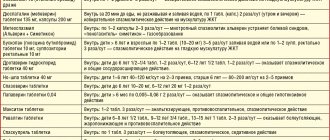Dysbacteriosis in most cases is accompanied by diarrhea and other unpleasant sensations in the stomach. To eliminate symptoms, it is necessary to use astringents and enzyme agents. But sometimes this is not enough, since dysbiosis can be accompanied by the presence of intestinal infections that require more serious treatment.
These drugs include intestinal antiseptics, which are quite effective in treating dysbiosis. Antiseptics are not among the drugs that restore the microflora and intestinal mucosa; their action is aimed at reducing the proliferation of harmful bacteria, which leads to a reduction in the symptoms of dysbacteriosis and a quick cure.
Intestinal antiseptics for dysbacteriosis
These drugs are not absorbed from the intestines, which allows you to achieve maximum results from taking antiseptics. Their action is aimed specifically at the site of the disease, while at the same time the microflora is restored by destroying pathogenic bacteria. In addition to dysbiosis, antiseptics are prescribed for bacterial diarrhea.
There are several types of antiseptics with which you can achieve different results. It is worth remembering that these drugs are only auxiliary; for intestinal infections, the doctor may prescribe antibacterial drugs, as well as pribiotics and probiotics.
Intestinal antiseptics are taken in a course of 1 week or more, depending on the severity of the disease. This increases the chance of getting rid of the symptoms of dysbiosis as soon as possible. Intestinal antiseptics have a wide spectrum of action and can help get rid of many diseases.
Taking antibiotics for prevention
Sometimes a person becomes infected with an intestinal infection due to circumstances beyond his control. However, if you follow good hygiene, the risks can be minimized.
If you take intestinal antiseptics while hiking or traveling, you can minimize the risk of developing an intestinal infection.
Author of the article:
Danilova Tatyana Vyacheslavovna |
Infectious disease specialist Education: in 2008, received a diploma in the specialty “General Medicine (Therapeutic and Preventive Care)” at the Russian Research Medical University named after N. I. Pirogov. I immediately completed an internship and received a diploma as a therapist. Our authors
Enterofuril for dysbacteriosis
Enterofuril has an antimicrobial effect, has a wide spectrum of action, helps stop the proliferation of pathogenic bacteria, suppressing their negative impact on the intestinal microflora. This drug is effective in quickly eliminating symptoms, as well as eliminating intestinal infections.
Enterofuril belongs to the nitrofurans, the action of which is aimed at eliminating infectious and inflammatory diseases. Nitrofurans have a high risk of side effects, but despite this, Enterofuril does not have such disadvantages, since the drug begins to act immediately after entering the intestines, but is absorbed into the blood.
The drug can be combined with other medications, including antibiotics, this can reduce the risk of developing dysbiosis in the future. Enterofuril is allowed to be taken by both adults and children, since it is well tolerated and has a mild effect on the body.
Indications for use
The drug is prescribed when the following factors cause diarrhea:
- acute diarrhea caused by pathogenic microbes;
- chronic course of the disease;
- colitis;
- diarrhea caused by taking other medications;
- acute or chronic diarrhea of unknown origin.
Enterofuril has bacterial activity against staphylococcus, salmonella, streptococcus, Escherichia coli, cholera and gastric ulcers.
Immediately after taking the drug, the following therapeutic actions occur:
- blocking the toxic effects of pathogenic microbes;
- increasing immunity;
- antidiarrheal effect;
- bactericidal and bacteriostatic effect;
- prevention of recurrent infections.
Enterofuril does not have a negative effect on beneficial bacteria, thereby not suppressing the beneficial composition of the intestinal microflora.
Mode of application
The drug is available in the form of capsules and suspensions, with varying amounts of active substance. Enterofuril is prescribed according to the following regimens:
- For children over 7 years old, as well as for adults – 1 capsule 4 times a day at the same time.
- For children over 7 years old and adults – a single dose of 4 capsules.
- Taking the suspension for children over 7 years old and adults – 200 ml 4 times a day or 800 ml once.
Directions for use of the drug for children under 7 years of age:
- From 1 to 6 months – 100 ml up to 3 times a day or once.
- From 7 months to 2 years – 100 ml up to 4 times a day or once.
- From 2 to 7 years – 600 ml once a day.
The duration and method of administration depends on the severity of the disease and the individual characteristics of the patient.
Contraindications and side effects
Like any drug, Enterofuril has the following contraindications:
- up to 7 years, the drug can only be used in suspension;
- should not be taken for diarrhea caused by toxic secretions of worms;
- individual intolerance to the components of the drug;
- cannot be used in premature infants;
- the drug in any form should not be taken for more than 7 days;
- The drug should not be prescribed in any form for up to 1 month.
In most cases, this drug does not cause side effects. In some cases, an allergic reaction may occur due to high sensitivity to the active component. If any manifestations occur, you must stop taking Enterofuril and consult a doctor.
Contraindications and precautions
Antibiotics for diarrhea in adults are used in the treatment of intestinal infections - salmonellosis, dysentery, cholera, typhoid fever, and escherichiosis. Without these drugs, pathogenic bacteria will begin to grow, multiply, and spread throughout the body through the bloodstream. But with a mild course of the disease in adults, doctors prefer not to treat diarrhea with antibiotics on the first day. After all, along with liquid feces, infectious agents are also removed from the gastrointestinal tract.
Children are prescribed antibiotics immediately to prevent the development of the most dangerous condition for them - dehydration, loss of important macro- and microelements.
An absolute contraindication to the treatment of diarrhea with antibacterial agents is individual intolerance to the ingredients. Many antibiotics are prohibited from taking in childhood, pregnancy and lactation. If you have severe liver and kidney diseases, you should consult a doctor.
Taking antibiotics for diarrhea of unknown etiology lasts no more than 3 days. The lack of improvement indicates the non-bacterial nature of the disease or the resistance of the pathogen to this drug. The medicine is discontinued and another is prescribed.
Ersefuril for dysbacteriosis
Ersefuril is an intestinal antiseptic that has an antidiarrheal effect and is used to treat infectious diseases. The drug begins its action immediately after use without being absorbed into the blood, which reduces the risk of side effects.
The drug is able to cope with any gastrointestinal tract infections caused by E. coli, Shigella or Salmonella. Has a beneficial effect on intestinal flora. The medication is well tolerated by patients, but it is worth considering that it cannot be used for general poor health caused by dysbacteriosis. Therefore, if weakness, nausea or vomiting, or increased body temperature are observed, then Ersefuril is not recommended.
Immediately after administration, the destruction of pathogenic cells and the strengthening of the immune system begins to occur. The course of treatment is no more than 14 days, depending on the severity of the infectious intestinal disease.
The main indication for use is diarrhea caused by various types of bacteria, in the absence of complications.
Features of application
In the absence of complications, the drug is recommended to be used according to the following scheme:
- For children over 6 years old – 3 capsules several times a day.
- For adults – 4 capsules 4 times a day.
The duration of treatment is no more than 7 days; in some cases, the doctor may extend the treatment for several days.
In the presence of diarrhea, accompanied by nausea, vomiting and refusal to eat, the drug in the form of a solution is administered intravenously. Taking Ersefuril does not have a negative effect on concentration and reaction speed, which makes it possible for those whose position involves managing transport and complex machinery to continue working during treatment.
Contraindications and side effects
Ersefuril has the following contraindications:
- children under 6 years old;
- During pregnancy and breastfeeding;
- hypersensitivity to components;
- acquired or congenital deficiency of sucrase and isomaltase;
- impaired absorption of galactose and glucose.
The drug is easily tolerated by patients; in rare cases, an allergic reaction may occur, manifested in the form of a rash, anaphylactic shock and Quincke's edema. At the onset of such manifestations, you should immediately stop taking the medication.
The most effective and most popular antibiotics
There are no universal antibiotics, just as there is no cure for all diseases. However, some groups of antibiotic drugs act on several types of bacteria at once, and therefore have gained great popularity. But a wide spectrum of action is not the only criterion by which the benefits should be assessed:
- the medicine should be absorbed only in the lower parts of the gastrointestinal tract, and not be destroyed by gastric juice or enzymes;
- absorption of the drug components into the blood before they enter the large intestine should be minimal;
- toxicity level of the product - the lower the better;
- compatibility with other medications is important in complex therapy.
Antibiotic therapy is appropriate if the following indications exist:
- moderate condition in an infant;
- severe condition in adult patients, with severe signs of dehydration;
- the appearance of symptoms of general sepsis;
- the presence of hemolytic anemia, immunodeficiency, cancer;
- development of distant foci of infection located outside the gastrointestinal tract;
- secondary complications;
- the appearance of blood inclusions in the stool.
This group of drugs is also used to treat severe gastrointestinal lesions, including bacterial food poisoning, dysentery, typhoid fever, salmonellosis, cholera, and escherichiosis. But it is contraindicated or used with caution in the following cases:
- mental disorders;
- blood clotting disorders;
- anemia;
- renal or liver failure;
- atherosclerosis;
- suffered a stroke;
- hypersensitivity to one or more components of the drug.

The doctor determines the need to take medications after laboratory tests of blood (ESR level, presence of leukocytosis, formula shift) and feces (detection of blood, mucus, study of the number of leukocytes). Quarantine allows you to avoid infection of family members, colleagues, and classmates.
Loperamide for dysbacteriosis
Loperamide is an intestinal antiseptic, helps eliminate infectious diseases, and is also used as an antidiarrheal agent. The effect of the drug is similar to phenylliperidine derivatives. Restores intestinal motility, reduces motility and tone of intestinal muscles.
The main indication for the use of Loperamide is acute or chronic diarrhea that occurs against the background of a disrupted diet and poor nutrition. It has an antisecretory effect, which helps reduce the production of gastric juice, as well as intestinal and pancreatic juice.
Unlike Enterofuril, this drug has side effects that manifest themselves in the form of various allergic reactions, sleep disturbances, dizziness and drowsiness. Therefore, Loperamide must be taken strictly according to the instructions prescribed by your doctor individually. The dosage and course of administration depend on the course of the disease, the effect occurs as soon as possible and lasts up to 6 hours.
Nifuroxazide for dysbacteriosis
Nifuroxazide is an intestinal antiseptic for the treatment of disturbed intestinal microflora. It has an antibacterial and bactericidal effect, helps eliminate various infections. Due to the rapid action, the drug does not have time to be absorbed into the blood, which eliminates the harmful effect on the intestinal microflora.
Indications for use of the drug:
- colitis;
- intestinal dysbiosis;
- diarrhea caused by infection;
- food poisoning.
- prevention of infection during operations, for example, for appendicitis.
It has a negative effect on pathogenic microbes, not giving them a chance to reproduce. The medicine can be used by adults and children from 2 months.
Mode of application:
- Adults and children over 6 years old – 2 tablets 4 times a day.
- Children from 2 to 6 months - the drug is given in the form of a suspension of ½ tsp. 2 times a day.
- For children from 6 months to 6 years – 1 tsp. Suspensions up to 3 times a day.
During the treatment of dysbiosis with Nifuroxazide, it is necessary to adhere to proper nutrition. It is important to exclude raw vegetables and fruits, as well as spicy and fatty foods, since these foods can cause inflammation and irritation of the intestinal mucosa. Due to the high effectiveness of the drug, as well as the presence of absorbent properties that help remove toxic substances, treatment occurs quickly. Nifuroxazide can be combined with other medications. The course of treatment is from 5 to 7 days. If any reactions occur, the drug should be discontinued. Some patients observe the appearance of disturbances in the functioning of the digestive tract; if such an effect occurs, the medication does not need to be stopped.
If nausea, vomiting, diarrhea, or weakness occur, poisoning or an intestinal infection is often suspected. This is a group of diseases united by etiological, pathogenetic and symptomatic features.
The pathogenic microorganisms that cause this infection are of different origins:
- bacteria;
- viruses;
- the simplest.
Intestinal infections of bacterial and viral etiology occupy a larger share in the structure of all infections in the intestines. Therapy is aimed at eliminating the root causes - pathogens of diseases.
Depending on the type of microorganism, treatment is prescribed. If the disease is of bacterial etiology, an antibacterial drug is prescribed.
An antibiotic for poisoning and intestinal infections is prescribed after diagnosing the disease and determining the type of pathogen. Since most microorganisms have acquired drug resistance, when diagnosing the type of pathogen, a test is done to determine the sensitivity of pathogens to antibiotics.
The doctor will tell you which antibiotics to take for an intestinal infection in your situation.
How to increase the effectiveness of antibacterial therapy?
There are many medicinal products that are not antibiotics, but they are often used in the treatment of gastritis. Such medications are prescribed to enhance the antibacterial activity of antimicrobial agents and alleviate the patient’s condition.
- Antacids are used for high acidity. The drugs “Almagel”, “Maalox”, “Rennie” and others can reduce the acidity of the stomach contents, thereby preventing the destructive effect.
- Antispasmodics and analgesics eliminate pain. The drugs “No-Shpa”, “Baralgin”, “Nitroglycerin” accelerate the onset of the effect of antibiotic treatment.
- Enzymes normalize digestive function. The drugs “Mezim” and “Digestal” can be used during the antibacterial course or after its completion.
- Antisecretory drugs reduce the secretion of hydrochloric acid and gastric juice. The drugs Famotidine and Ranitidine are antihistamines.
- To reduce the acidity of the stomach and increase the effectiveness of antibiotics, Omez, Omeprazole and their analogues are prescribed.
Antibiotics for treatment
There are often cases when it is not possible to call a doctor. We will tell you how to determine which antibiotic for an intestinal infection is right for you and describe what antibacterial drugs exist.
The treatment regimen includes a broad-spectrum antibiotic:
- Cephalosporins are bactericidal antibiotics. Trade names: “Cefotaxime”, “Cephabol”, “Rotsesim”, “Claforan”. They are similar in structure to penicillins, but have a side effect - allergies.
- Tetracyclines are well absorbed from the gastrointestinal tract when taken orally, have a bacteriostatic effect, cause complications (up to deafness), and are contraindicated in children. Trade names: Doxycycline, Vibramycin, Tetradox.
- Penicillins - "Amoxicillin", "Ampicillin", "Monomycin" and others - have good penetration into the body's cells and selectivity of action, without having a harmful effect on systems and organs; approved for use by children, pregnant and lactating women, side effect - allergic reactions.
- Aminoglycosides - Gentamicin, Neomycin and others - are used to treat diseases with the spread of microbes in the body, including sepsis, are highly toxic, affect the kidneys, liver, and are permitted for health reasons.
- Fluoroquinolones are antibiotics that inhibit the enzyme responsible for DNA synthesis in microbes; prescribed by doctors. Use with caution in people suffering from diseases with vascular lesions; prohibited for children under 18 years of age, pregnant and lactating women. Trade names: “Levofloxacin”, “Ciprolet”, “Norfloxacin”, “Ofloxacin”, “Normax”, “Ciprofloxacin” and others.
- Macrolides - Roxithromycin, Azithromycin, Erythromycin - have a bacteriostatic effect and are effective against microorganisms. Approved for use by children, pregnant and lactating women, when penicillins are contraindicated due to an allergic reaction.
- Levomycytin (chloramphenicol), a drug for intestinal infections, has lost its popularity due to side effects, one of which is bone marrow damage.
Most antibiotics are used to treat infectious diseases. Penicillins and aminoglycosides are used to treat ENT organs, laryngitis, tracheitis, bronchitis, pleurisy (presence of fluid in the lungs), etc.
And for intestinal infections, antibiotics from the groups of cephalosporins and fluoroquinolones, sulfonamides are prescribed. Tetracycline is rarely prescribed: mainly only for health reasons.
In the event of an acute infection, an antibacterial drug is prescribed in 100% of cases, in the form of injections. Modern dosages of drugs suggest a course: one injection per day for 7 days. Antibiotics for intestinal infections in adults are all used.
Intestinal antiseptics
They are becoming increasingly popular. These are drugs that destroy pathogenic intestinal flora without affecting the normal flora.
Antiseptics suppress the growth of opportunistic microflora - staphylococcus, Proteus and others. Prescribed in pediatric practice or when there are contraindications to antibacterial drugs:
- "Ersefuril" (nifuroxazide) - has no contraindications, is approved for use in children over 6 years of age, suppresses the growth of pathogenic microflora. Microorganisms have not developed resistance to the drug. Effective against dysentery and rotavirus infection.
- "Furazolidone" is a proven antibacterial drug, effective against pathogens such as Shigella, Salmonella, and other bacteria, and has an immunostimulating effect;
- “Intetrix” is not only an antimicrobial, but also an antifungal and amoebocidal agent, it causes side effects: nausea and stomach pain, it is used as a prophylactic agent during hikes and travel;
- "Fthalazol" is a broad-spectrum drug that is active against pathogens. It helps quickly, has a number of side effects, and is prescribed with caution to children.
- "Enterol" is a live yeast that is an antagonist of pathogenic microorganisms. The drug contains a protease enzyme that destroys endotoxins produced by pathogenic bacteria such as clostridia and Escherichia coli. There are also probiotics that promote the growth of “beneficial” intestinal flora. Additional medications after antibiotics are not needed. The effect is noticeable after taking one capsule. The drug should not be used in combination with antibiotics or adsorbents. Recommended for use by children, pregnant and nursing mothers. Has no contraindications.
How is a specific drug selected?
The above drugs can be prescribed only in case of a preliminary diagnosis of an infectious process. The patient cannot independently determine the origin of the disease, since the clinical symptoms of intestinal infections, ulcerative colitis, and surgical pathology of the gastrointestinal tract are largely similar. Uncontrolled use of intestinal antiseptics may cause side effects and not improve the patient's condition.
In modern practice, it is allowed to prescribe intestinal antiseptics until the results of a bacteriological examination of feces are obtained. The wide spectrum of effects of nitrofurans and sulfonamides, the low level of resistance of microorganisms to these drugs allows you to quickly cure a patient from a bacterial infection and some protozoal invasions.
In continuation of the topic, be sure to read:
- Probiotics and prebiotics: definition and list of drugs
- What are probiotics, names of drugs and their types
- What are synbiotics, their benefits and list of drugs
- Symbiotics: concept, list of drugs and products
- Bifidobacteria: concept, functions and sources of beneficial microorganisms
- What are prebiotics, their benefits and list of drugs
- Lactulose-based laxatives: list of products and features of their use
- What to take along with antibiotics to prevent intestinal dysbiosis?
- Bifidobacteria and lactobacilli in one preparation
- Intestinal bacteria in preparations: list of medications and their use
Antibiotics for children with intestinal infections
What is prescribed for children with an intestinal infection, every mother asks. Treatment of children is prescribed with great caution. The criterion of safety comes first, then efficiency.
For children, drugs are produced that act in the intestines with a minimum of side effects. Antibacterial therapy does not have a systemic effect.
List of drugs approved for use:
- “Amoxiclav”, “Augmentin”, “Amosin”, “Flemoxin”, “Solutab” are penicillin drugs that cause an allergic rash in a child, are well absorbed, and are considered one of the safest. Doctors prescribe penicillins protected with clavulanic acid (“Amoxiclav”): most microorganisms are resistant to the action of penicillins.
- “Supprax”, “Cefalexin”, “Zinnat” are low toxic, effective in the treatment of intestinal infections, and are contraindicated for newborns.
- “Summamed”, “Vilprafen”, “Clarithromycin” - hypoallergenic, the oldest antibiotic, highly active against bacteria, approved for children, available in tablets, capsules and suspensions;
- "Enterofuril" (nifuroxazide), "Nifurazolidone" - have a dose-dependent effect and are the main drugs of choice for treatment in children. They are not absorbed into the blood or intestines and do not have a systemic effect on the body. Not absorbed into breast milk, allowed for pregnant women; Children are given from 1 month.
For mild illnesses, the child is cured after using intestinal antiseptics.
If the disease is of moderate severity, the first choice drugs are penicillin antibiotics: Ampicillin, Amoxiclav.
If the penicillins used are not suitable due to side effects or existing contraindications in the child, give an antibiotic from the macrolide group, Azithromycin, against an intestinal infection.
Antibacterial agents in the treatment of diarrhea
Drugs from the category of antibiotics for diarrhea can be indicated only in one case: if the origin of the intestinal disorder is of infectious origin. If the drug is viral in nature, it will not give the expected therapeutic result.
What medications can you start taking before consulting with doctors? If a person is sure that the cause of the disorder is an infection, and the stool does not contain blood, then the following medications are allowed:
Intestinal antibiotics are a reliable remedy for various diseases caused by the vigorous activity of protozoa, enteroviruses and microbes. These medications are necessary in cases where the body is not able to cope with the pathogen on its own and requires active outside help for complete recovery. They allow you to successfully fight intestinal infections of various origins, stop the inflammatory process and further reproduction of the virus.

Pros and cons of using antibiotics for intestinal infections
Side-effects come with taking medications. Thrush in women (mucosal candidiasis), dysbiosis, antibiotic-associated diarrhea (AAD), intestinal dysfunction and others.
Advantages of the drugs:
- influence on the cause of the disease;
- quick cure if an effective antibiotic is selected;
- suppression of the influence of toxic substances on the body;
- destruction of pathogenic microflora.
- presence of contraindications;
- influence on the functioning of the human body;
- impossibility of use in children, pregnant and lactating women;
- the occurrence of diseases while taking antibiotics.
Summarize
Treatment of gastritis with antibiotics is almost always effective. It is important to choose the right drug and take it strictly as prescribed by your doctor. Even if you feel much better, you should not stop taking the medicine on your own. The antibacterial course must be completed completely. Otherwise, the bacteria will develop resistance, and repeated treatment will be ineffective.
The negative effects of antibiotics on the human body are known to many patients. However, the treatment of gastritis cannot be done without these drugs. Subsequently, the patient will need a recovery course, including vitamins, immunomodulators and probiotics. When treating gastritis, do not forget to follow your doctor’s recommendations regarding lifestyle and nutrition.
Reviews about the treatment of intestinal infections
The most effective drugs with a minimum of side effects are Norfloxacin (trade name Normax) and Levofloxacin. They are prescribed for bacterial infections of the urinary system, urethritis, cystitis, and traveler's diarrhea. Norfloxacin is used to treat pyelonephritis, salmonellosis, and shigella. Contraindications: childhood, pregnancy and lactation. Use with caution for epilepsy, atherosclerosis, and gastrointestinal ulcers.
Mothers speak out in favor of Enterosfuril. The drug is prescribed by pediatricians to every child with suspected intestinal infection. Safe for children, Enterosfuril alleviates the child’s condition with intestinal infections, relieving vomiting and diarrhea.










